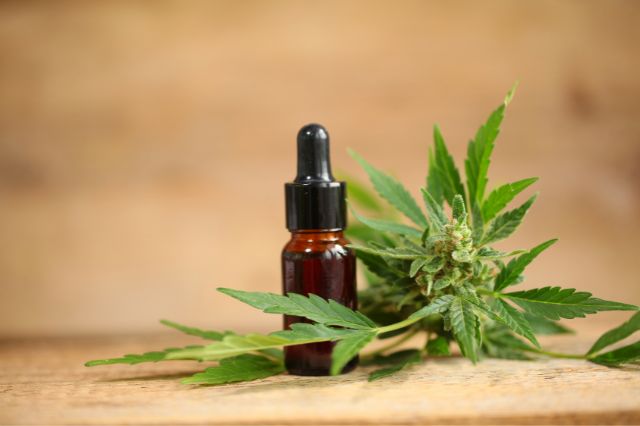CBD oil is a product commonly derived from the cannabis sativa plant and blended with a neutral carrier oil such as hemp seed oil to make it consumable. A recent survey by OnePoll revealed that out of 60% of US adults who reported using CBD, 55% preferred using CBD oils and tinctures.
Scientific research on CBD is expanding, and the following are ten ways that studies suggest CBD oil can improve your health and have some potential side effects.
1. Offset Anxiety and Depression
One of the most common reasons for the widespread use of CBD is its ability to alleviate anxiety and promote calmness. A 2017 study published in the Brazilian Journal of Psychiatry examined the anxiety levels of 57 men subjected to a simulated public speaking test.
Some were given a placebo, while others were given 150, 300, or 600 mg of CBD before their speeches. Results showed that those who received 300mg of CBD experienced less anxiety during the test compared to those who were given a placebo.
2. Reduce PTSD Symptoms
CBD has shown the potential to reduce symptoms of post-traumatic stress disorder (PTSD), according to a small 2018 study published in the Journal of Alternative and Complementary Medicine.
The study involved 11 individuals with PTSD treated with CBD in addition to standard psychiatric care for eight weeks in an outpatient psychiatric clinic.
3. Treat Select Epilepsy Syndromes
CBD has been found to potentially treat epileptic seizures in certain cases. In 2018, the FDA approved the use of CBD, marketed under the name Epidiolex, for treating seizures caused by Lennox-Gastaut syndrome and Dravet syndrome – two uncommon types of epilepsy – in patients aged two years or older.
The study revealed that 10 of the 11 individuals experienced reduced PTSD symptoms. Furthermore, the researchers observed that CBD was generally well-tolerated by the participants.
4. Treat Opioid Addiction
CBD has shown promise in treating opioid addiction, as indicated by some preclinical animal studies and human clinical trials. One study involved administering CBD to individuals with heroin use disorder.
The results revealed that CBD significantly reduced cue-induced cravings, withdrawal anxiety, resting heart rate, and salivary cortisol levels in the participants over the course of a week. Notably, no significant adverse effects were reported.
5. Alleviate Persistent Pain
In 2005, Canada approved Sativex, an oromucosal spray containing equal proportions of THC and CBD, for treating central neuropathic pain associated with multiple sclerosis.
In 2007, the medication was approved for use in treating cancer pain that was unresponsive to other treatments. Ongoing studies have indicated that CBD effectively treats chronic, non-cancer pain in the United States.
6. Mitigate ALS Symptoms
No known cure for ALS exists, and only two FDA-approved medications are available to alleviate its symptoms. However, research suggests that the combination of THC and CBD may have an entourage effect that can benefit people with ALS, similar to those with PTSD.
7. Protect Against Neurological Disease
Studies suggest CBD has antioxidant and anti-inflammatory properties, which can provide significant neuroprotection against various pathological disorders.
While preclinical studies indicate CBD’s potential to benefit conditions such as Parkinson’s disease, Alzheimer’s disease, and multiple sclerosis, further clinical research is needed to confirm its efficacy as a treatment for these disorders.
However, positive results were not recorded for conditions like Huntington’s disease and cerebral ischemia.
8. Ease Diabetic Complications
CBD has shown the potential to reduce the effects of high glucose levels on cells in the body, which is a precursor to the development of diabetes and its complications.
Studies on human cells suggest that CBD can have significant benefits for patients with diabetes, including those with plaque buildup in artery walls.
9. Support for Cancer Patients
CBD oil has been found to be effective in alleviating some symptoms related to cancer treatment, such as nausea and pain. A recent study showed that patients undergoing chemotherapy reported reduced chemotherapy-induced side effects, particularly nausea, when they used CBD oil.
Additionally, many of these patients reported experiencing less pain and discomfort when using CBD oil. While more research is needed, these findings suggest that CBD oil may offer much-needed relief to cancer patients.
10. Inhibit Arthritis Symptoms
In 2006, a study was conducted to examine the effects of Sativex, CBD-based botanical drug approved in the UK in 2010, on patients with rheumatoid arthritis.
The study, which involved 58 patients, found that Sativex significantly improved sleep quality, pain during movement, and pain at rest compared to a placebo.
This was the first controlled trial of Sativex as a treatment for rheumatoid arthritis. CBD was shown to have pain-relieving properties and the ability to suppress disease activity.
Potential Side Effects
While CBD is generally considered safe and well-tolerated, some people may experience adverse reactions. Side effects documented in studies include changes in appetite and weight, diarrhea, and fatigue.
Other side effects, such as sedation, drowsiness, abnormal liver function test results, and pneumonia, have been reported in childhood epilepsy studies. However, these side effects could be a result of CBD interacting with other medications, such as clobazam.
It’s important to note that CBD can interact with several medications, including pain medications, seizure medications, antidepressants and diabetes medications. Therefore, before trying CBD oil, it’s crucial to discuss it with a healthcare professional to assess its safety and avoid potentially harmful interactions.






